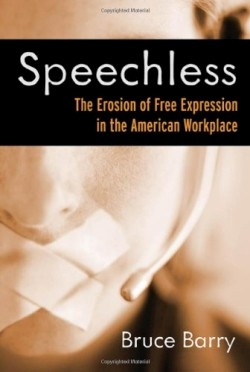Speechless
The Erosion of Free Expression in the American Workplace
“Nothing was your own except the few cubic centimeters inside your skull,” this introductory epigraph of Speechless is a quotation from Nineteen Eighty-four. What follows is Barry’s assertion that some of Orwell’s predictions are, even now, closer to fact than fiction in that most employees in America do not have the right to free speech that they probably assume is theirs.
Barry contends that the workplace is where most adults exchange ideas with other adults. This exchange is necessary in a democratic society.
But our society, Barry says, is a “legal and economic system under which employers don’t just buy a person’s labor; they also reserve the right to rent an employee’s conscience, ideology, and social identity.” That system is governed by the concept of employment-at-will. Absent a contract, an employer can fire an employee for any reason or no reason, and an employee can quit at any time. Judicial rulings on lawsuits filed by terminated employees claiming their rights to free speech were violated have not always been consistent, according to Barry.
The author isn’t an attorney, yet he discusses dozens of court cases. His research is thorough and includes forty-two pages of notes; however, his writing style is astringent enough to counter the dryness of the material. For example, after describing a case lost by an employee whose employer fired him for seeking a political office as illustrating a “woeful lack of rights to workplace expression that many Americans are forced to endure.” Barry concludes: “If it feels as though this outcome offends common-sense principles of a citizen-based democracy, it’s only because it does.”
Besides employment-at-will, Barry says the other major impediment to employee free speech is the doctrine of state action. The rights granted by the Constitution apply only when government is involved. In other words, the First Amendment doesn’t create the right to speak freely. It protects against Congressional or state action curtailing such expression. Constitutional rights exist for those in government jobs but not necessarily for those in private employment.
Barry, a management and sociology professor at Vanderbilt University, advocates implementing just cause firing rules and fair procedures for challenging dismissals for both public and private employees. He also favors expansion of “lifestyle discrimination laws” that protect employees who engage in legal activities, such as blogging, in their off-work time that do not threaten their employer’s business.
Barry’s book is not an easy read, but the information he provides is eye-opening for anyone who has a job. Big Brother isn’t just a figment of the imagination.
Disclosure: This article is not an endorsement, but a review. The publisher of this book provided free copies of the book to have their book reviewed by a professional reviewer. No fee was paid by the publisher for this review. Foreword Reviews only recommends books that we love. Foreword Magazine, Inc. is disclosing this in accordance with the Federal Trade Commission’s 16 CFR, Part 255.

